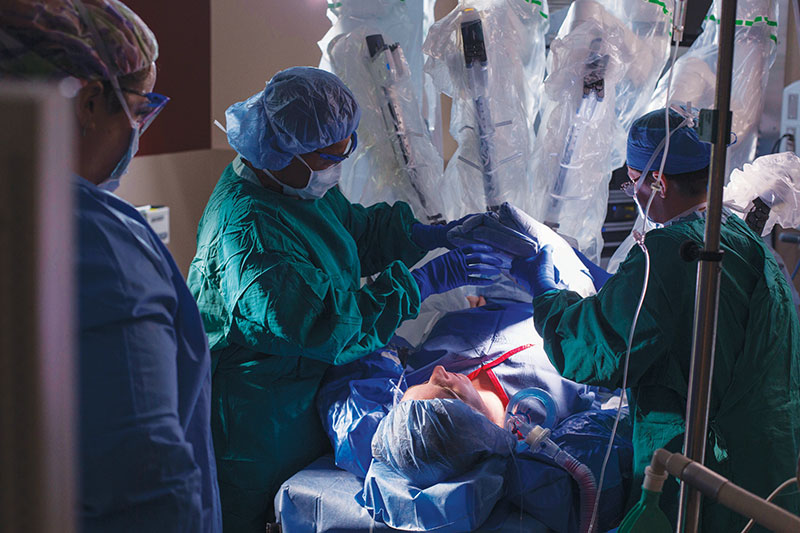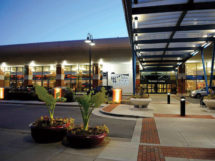
da Vinci Si and two Mako robots. The technology allows surgeons to be more targeted and precise.
From virtual patient visits to surgical robots and everything in between, health care has been transformed by innovative technological advances. Major health care providers in Louisville are utilizing new technology to improve health outcomes.
Innovative thinking and research have played a large role in Norton Healthcare’s response to COVID-19.
 In April 2020, Norton Healthcare had the first patient in the world to participate in a randomized clinical trial using selinexor, a low-dose cancer treatment, to study whether it could benefit COVID-19 patients. Norton physicians also are testing an experimental COVID-19 treatment, with approval from the Food and Drug Administration (FDA), using convalescent plasma taken from blood donated by fully recovered COVID-19 patients, said Russell F. Cox, president and CEO of Norton Healthcare.
In April 2020, Norton Healthcare had the first patient in the world to participate in a randomized clinical trial using selinexor, a low-dose cancer treatment, to study whether it could benefit COVID-19 patients. Norton physicians also are testing an experimental COVID-19 treatment, with approval from the Food and Drug Administration (FDA), using convalescent plasma taken from blood donated by fully recovered COVID-19 patients, said Russell F. Cox, president and CEO of Norton Healthcare.
“We are recruiting candidates to donate plasma that may contain coronavirus-fighting antibodies,” Cox said. “Convalescent plasma has been used over the past several years to treat severe illnesses, such as severe acute respiratory syndrome (SARS), avian influenza and Ebola virus. As an experimental treatment, the initial convalescent plasma procedure was available only to patients who were severely ill from the disease. However, as more people have donated plasma, we have been able to expand the trial to less severely ill patients.”
Norton’s researchers are encouraged by preliminary results, he said. The supply of donated plasma has allowed the hospital to treat nearly 60 patients as of early June 2020, which is well over the number treated by many larger, academic health systems in the country, Cox said.
Additional research trials at Norton will include treatment of COVID-19 patients who also have heart issues,
he said.
Because it received positive feedback on its temporary drive-through COVID-19 testing center, Norton also plans to set up a permanent express laboratory and testing location where patients can get receive vaccines; lab work; clinical tests for illnesses such as COVID-19, flu and strep; minor X-rays and electrocardiograms (EKGs), the
Cox said.
The pandemic amplified the strengths of UofL Health, said UofL Health CEO Tom Miller.
“As the region’s academic medical system, planning and preparedness is in the DNA of UofL Health,” he said. “Throughout the COVID-19 pandemic, our 600 providers and more than 12,000 team members remained both nimble and steadfast. They never wavered from their commitment to care for the community and quickly adapted to its needs.”
Because of visitor limitations, UofL Health members “doubled down,” Miller said, playing their roles as caregivers but also becoming extended family members to patients and their families, “holding tablets so relatives could interact from afar and holding hands to comfort those most in need,” he said.
- IT’S FREE | Sign up for The Lane Report email business newsletter. Receive breaking Kentucky business news and updates daily. Click here to sign up
Staff members rose to the occasion by developing processes for ongoing information gathering and dissemination to make sure everyone in the health system had the most up-to-date information regarding cases, testing, treatment, Miller said.
UofL Health played a large role in helping Louisville combat the coronavirus. It opened Kentucky’s first drive-thru COVID-19 testing site, developed sanitizing initiatives, kickstarted research for a cure, and collaborated with others to share expertise with health systems across the commonwealth, he said.
UofL Health physicians also work alongside University of Louisville researchers to develop and implement clinical trials that bring cutting edge care to the region.
“Most recently the research taught the world about asymptomatic people who are highly infectious, taught care providers about how COVID-19 is spread in hospitals from workers or other patients, and we learned how different swabs or collection methods could be used in real time, as the supply chain for swab kits became a limiting factor in getting enough people tested,” Miller said.
UofL Health also has ongoing clinical trials with different types of therapeutic agents and different types of detection technologies.
“The side-by-side development of health care technology with clinical testing is a rich environment for a robust technology ecosystem to grow and contribute significantly to the economic engine for the greater Louisville region,” Miller said.
COVID-19 affected Baptist Health Louisville in numerous ways, including adjusting to the changing Centers for Disease Control and Prevention (CDC) recommendations throughout the pandemic, said Larry W. Gray, hospital president. The hospital has been focused on providing the safest environment of care for its patients and staff, screening everyone at entrances and requiring all staff, visitors and patients to wear masks.
Gray said he has been proud of how the entire staff stayed focused on the hospital’s values and cared for patients.
“They have risen to the occasion at every step during this challenging time, and shown themselves to be competent and courageous,” he said.
New tech improving patient care; virtual visits on the rise
At UofL Health, robotic surgery use is on the rise. Between its two downtown hospitals, UofL Health utilizes five surgical robots – two daVinci Xi robots, one daVinci Si and two Mako robots.
“The daVinci (robots) are primarily used for gynecologic oncology, colorectal and complex urologic procedures, although we are seeing increased used for cardiothoracic, general surgery and other oncology procedures,” Miller said. “The Mako robots are used for orthopedic procedures, especially total knee replacements.”
The technology allows surgeons to be more targeted and precise, he said, offering patients minimally invasive surgery that improves outcome and quickens recovery time, he said.
Cardiologists at Baptist Health also are using technological advances to perform trans-aortic valve replacement (TAVR) that allows a new heart valve to be deployed through a catheter with no surgery involved, Gray said. The hospital system also recently added a second da Vinci robot, complete with the newest technology for its surgeons.
Baptist Health Louisville’s virtual care options for mental health and telepsychiatry expanded during the height of the pandemic, and e-visits with primary care doctors and specialists increased, he said.
Virtual health offerings at Norton are rapidly accelerating, including Norton eCare, telehealth and a new virtual hospital program that is currently used to follow up daily with emergency department and hospital patients discharged with COVID-19 or suspected COVID-19. The hospital plans to expand its virtual hospital model to include monitoring patients with various conditions to make sure their health is not deteriorating.
Before COVID-19, Norton saw an average of about 200 patients via Norton eCare and telehealth virtual visits; at the height of the pandemic locally, Norton providers saw an average of 1,400 patients daily through these phone and video visits, Cox said.
“Accessing health care in these ways will continue to grow in popularity, especially for certain populations such as the vulnerable, those who have limited mobility, and those with demanding schedules, young children or who live a good distance away from where they receive care,” he said.
“It’s a wonderful way we can meet our patients where they are,” he added.
Because provider-patient relationships are still a critical part of health care, Cox said, telehealth appointments are not always the best fit and will not replace all in-person visits. Virtual visits and the drive-through testing site are intended to provide patients with alternatives to ensure they receive the care they need.
The implementation, growth and acceptance of telemedicine “is a silver lining from the pandemic,” said UofL Health’s Miller. It forced all providers to find alternate ways to deliver care, he said.
“As physical distancing became more critical, our UofL Health IT team expedited the roll out of a telemedicine platform to make more than 600 providers available through mobile devices, tablets and computers. While patients have now returned to our facilities, COVID-19 has normalized telemedicine faster than expected and it will now forever be part of our care portfolio,” he said.
UofL Health’s telemedicine traffic quickly grew from a few appointments a week to nearly 2,000 a week, Miller said. Even though the hospital system is now welcoming more patients in person, telemedicine will now always remain an option for care.
Focusing on growth to support community needs
UofL Health has recently had a significant period of growth. Its purchase of the Louisville assets of Kentucky One Health and Jewish Hospital in 2019 made the health care system one of Kentucky’s largest regional health care systems, with more than 600 providers, five hospitals and multiple locations. It now employs 12,000 team members.
Before the pandemic, Miller said, UofL Health’s main focus was on aligning its providers and facilities to best serve the community. That’s still a priority.
Norton Healthcare has developed several partnerships over the past year to strengthen its organization. Those include an affiliation with UofL Physicians – Pediatrics and the University of Louisville School of Medicine, which was finalized March 1, 2020. Under the newly formed Norton Children’s Medical Group, affiliated with the UofL School of Medicine, 21 former UofL general pediatric and pediatric subspecialist practices are now part of Norton Healthcare,” Cox explained.
Norton also formed a joint venture partnership with LHC Group Inc. to create Norton Home Health, which provides services for patients in Louisville and across the region.
Norton was named the official health care provider of the UofL Cardinals and it opened eight new retail health clinics at Walgreens stores across the region. The health system also announced that it will contribute $5 million to the Louisville Urban League to build a multi-use sports and learning facility in West Louisville. The Norton Sports Health Athletics & Learning Complex will include seating for 4,000, an indoor-outdoor track and field space, a learning lab, an entertainment space, community green space and outdoor event space.
Norton Sports Health and Kentucky Orthopedic Rehab Team (KORT) established the Norton Sports Health Performance & Wellness Center, a rehabilitation and sports training center. A group of former University of Louisville football players are part owners in the sports training portion of the facility, Cox said.
In 2019, the Jennifer Lawrence Cardiac Intensive Care Unit (CICU), part of Norton Children’s Heart Institute, was dedicated at Norton Children’s Hospital. The CICU is a specialized unit for pediatric heart patients and includes 17 private rooms, including three specifically for newborns.
More development is in store for Norton. In January 2020, Louisville Metro government approved a $600 million bond issue to be used on capital spending for several projects, including adding new beds at Norton Brownsboro and Norton Hospital, infrastructure improvements, added technology and program expansion and more. Though COVID-19 is a setback, those projects are expected to move forward, Cox said.
Baptist Health Louisville is continuing to expand its reach as a tertiary referral center, specializing in cardiac surgery, orthopedics and neurosurgery. It has recruited new specialists, and has embarked on a strategic growth plan that expands its surgery capabilities and cardiac catheterization labs, Gray said.
The health system is doubling the size of its neonatal intensive care unit. Construction continued through the pandemic, and the expanded NICU is expected to open in July 2020, the hospital president said.
Baptist Health Louisville continues to focus on how it can grow and better serve the community.
“Our foundation has been working on a comprehensive strategy for philanthropic growth,” Gray said.
UofL Health
Number of employees: 12,000
About: UofL Health is a fully integrated regional academic health system with five hospitals, four medical centers, the Frazier Rehab Center and James Graham Brown Cancer Center, nearly 250 physician practice locations and more than 1,000 providers. It has specialists from every discipline experienced with a broad range of complex medical and surgical issues.
Norton Healthcare
Number of employees: 16,500
About: Norton Healthcare is one of Louisville’s largest employers, providing care at more than 250 locations throughout Kentucky and Southern Indiana. It has five hospitals (1,837 beds); seven outpatient centers; 14 immediate care centers; more than 1,000 employed medical providers and approximately 2,000 total physicians on its medical staff. Norton’s hospitals provide general care as well as specialty care in heart, neuroscience, cancer, orthopedic, women’s and pediatric services. The health system’s strong research program has access to clinical trials.
Baptist Health Louisville
Number of employees: 3,307 employees
About: Part of the Baptist Health family of hospitals, Baptist Health Louisville is a 519-bed hospital with a wide range of health care services, including emergency care, cancer care, women’s health, orthopedics, neurosurgery, cardiovascular services, sports medicine, wound care, behavioral health, occupational health, and in-home care provided by Baptist Health Home Care. Baptist Health Louisville has a large network of health care providers for patients in the Metro Louisville area.
By the numbers
Louisville’s health care industry
$80B — Revenue
124,000 — Jobs
4,100 — Health-related organizations
$64.3M — UofL research funding (2017)
18.2% — Percentage of Louisville jobs that are in health care
Industry leaders work together to attract companies, find innovative health solutions
The Greater Louisville region has long been at the center of innovation and leading-edge heart, hand and cancer research, according to a health care timeline compiled by the Health Enterprises Network (HEN), an investor-led organization affiliated with Greater Louisville Inc. (GLI) that works to champion and foster the growth of the region’s health care economy.
The first self-contained artificial heart implant surgery was performed by University of Louisville surgeon Dr. Laman Gray in 2001. It was the first artificial heart to be free of wires connecting it to the outside.
Kleinert Kutz Hand Care surgeons performed the first successful hand transplant surgery in 1999. In 2004, Norton Healthcare became the first in the region to acquire the da Vinci robotic surgical system.
Louisville has an abundance of health care, lifelong wellness and aging companies that are working to meet today’s needs and create the health and aging solutions of tomorrow. Louisville has more aging-innovation companies than anywhere in the world and is at the forefront of breakthrough technologies and cutting-edge care therapies for seniors worldwide, making it the epicenter for aging innovation. Louisville’s health care industry produces more than $80 billion in revenue annually.
The city also boasts a robust health innovation startup scene that provides a multidisciplinary ecosystem of support. There is a network of over 1,400 points of connection and interaction between 450 health and health-related companies in the region, according to the HEN. Attracting health-related companies to the region is one way to strengthen its rich environment for innovation, GLI has said.
HEN’s vision is for the region to be globally recognized as the location of choice for health-related businesses, researchers, educators, investors and consumers. It seeks to accomplish that through educational programming, collaboration between regional organizations, community-focused projects, professional networking and providing access to advocacy and health-related data resources.
HEN’s efforts are complemented by the work of another organization, the Louisville Healthcare CEO Council (LHCC), which works to help the industry solve important problems that are beyond the scope of any one single CEO or company. The council has representatives from some of the biggest names in health care, including Humana, Anthem, Kindred, Trilogy Health Services, Passport Health Plan, Hosparus Health, Apellis Pharmaceuticals, Signature Healthcare, Galen College of Nursing, Baptist Health, Norton Healthcare and BrightSpring Health Services, all of which are headquartered in Louisville.
Both organizations serve as a voice for the health care industry and represent the importance Greater Louisville has placed on nurturing health-related companies.
LHCC capitalizes on its sector strength to identify health care gaps and connect innovators with capital and customers. Each year, the CEOs identify a new challenge area relative to integrated care delivery and address each topic through a three-tiered strategic plan.
The strategic plan included the development of LHCC’s Corporate Innovation Center in a UofL-affiliated lab and office building on East Jefferson Street. A Discovery Lab program, housed at the center, was launched to meet two goals simultaneously for each company: first, catalog social determinants of health-related challenges as they impact customers and employees; and second, chart an innovation roadmap that identifies points of innovation and priorities for innovation metrics.
The other initiatives include establishing a health care aging innovation strategic investment fund and hosting a global conference on aging innovation, where selected innovators will pitch their ideas and products. The Aging Innovation Global Healthcare Summit is set for September 2020.
In May 2020, LHCC entered a strategic partnership with Aging2.0, the largest global innovation platform focused on aging. The global startup accelerator is moving its headquarters from San Francisco to the Corporate Innovation Center.
Health Enterprises Network
healthenterprisesnetwork.com
Louisville Healthcare CEO Council
lhccinc.com




















Add Comment